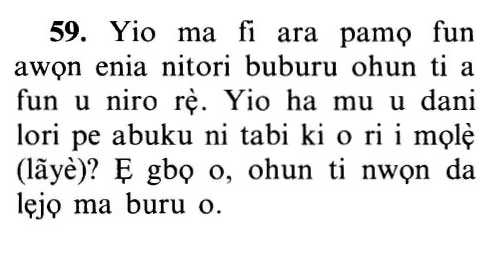16vs59
Select any filter and click on Go! to see results
يَتَوَارَى مِنَ الْقَوْمِ مِن سُوءِ مَا بُشِّرَ بِهِ أَيُمْسِكُهُ عَلَى هُونٍ أَمْ يَدُسُّهُ فِي التُّرَابِ أَلاَ سَاء مَا يَحْكُمُونَ
Yatawara mina alqawmi min sooi ma bushshira bihi ayumsikuhu AAala hoonin am yadussuhu fee altturabi ala saa ma yahkumoona
Yoruba Translation

Hausa Translation
Yanã ɓõyħwa daga mutãne dõmin mũnin abin da aka yimasa bushãra da shi. Shin, zai riƙe shi a kan wulãkanci kõ zai turbuɗe shi a cikin turɓãya To, abin da suke hukuntãwa ya mũnana.
Asbabu n-Nuzuul (Occasions of Revelation)
يَتَوَارَى مِنَ الْقَوْمِ ...
He hides himself from the people,
meaning he does not want anyone to see him.
... مِن سُوءِ مَا بُشِّرَ بِهِ أَيُمْسِكُهُ عَلَى هُونٍ أَمْ يَدُسُّهُ فِي التُّرَابِ ...
because of the evil of that whereof he has been informed. Shall he keep her with dishonor or bury her in the earth!
meaning, should he keep her, humiliating her, not letting her inherit from him and not taking care of her, preferring his male children over her!
أَمْ يَدُسُّهُ فِي التُّرَابِ (or bury her in the earth),
meaning bury her alive, as they used to do during the days of ignorance.
How could they dislike something so intensely, yet attribute it to Allah
... أَلاَ سَاء مَا يَحْكُمُونَ ﴿٥٩﴾
Certainly, evil is their decision.
meaning how evil are the words they say, the way they want to share things out and the things they attribute to Him.
As Allah says:
وَإِذَا بُشِّرَ أَحَدُهُم بِمَا ضَرَبَ لِلرَّحْمَـنِ مَثَلاً ظَلَّ وَجْهُهُ مُسْوَدّاً وَهُوَ كَظِيمٌ
And if one of them is informed of the news of (the birth of a girl) that which he sets forth as a parable to the Most Gracious (Allah), his face becomes dark, and he is filled with grief! (43:17)
" يتوارى من القوم " أي يكره أن يراه الناس " من سوء ما بشر به أيمسكه على هون أم يدسه في التراب " أي إن أبقاها أبقاها مهانة لا يورثها ولا يعتني بها ويفضل أولاده الذكور عليها " أم يدسه في التراب " أي يئدها وهو أن يدفنها فيه حية كما كانوا يصنعون في الجاهلية أفمن يكرهونه هذه الكراهة ويأنفون لأنفسهم عنه يجعلونه لله ؟ " ألا ساء ما يحكمون " أي بئس ما قالوا وبئس ما قسموا وبئس ما نسبوه إليه كقوله تعالى " وإذا بشر أحدهم بما ضرب للرحمن مثلا ظل وجهه مسودا وهو كظيم " .
"يتوارى" يختفي "من القوم" أي قومه "من سوء ما بشر به" خوفا من التعيير مترددا فيما يفعل به "أيمسكه" يتركه بلا قتل "على هون" هوان وذل "أم يدسه في التراب" بأن يئده "ألا ساء" بئس "ما يحكمون" حكمهم هذا حيث نسبوا لخالقهم البنات اللاتي هن عندهم بهذا المحل
أي يختفي ويتغيب .
I'raab - grammatical analysis of the Qur'an
«يَتَوارى » مضارع مرفوع بالضمة المقدرة على الألف للثقل والجملة حالية.
«مِنَ الْقَوْمِ» متعلقان بيتوارى.
«مِنْ سُوءِ» متعلقان بيتوارى.
«ما» موصولية في محل جر مضاف إليه.
«بُشِّرَ» ماض مبني للمجهول ونائب الفاعل محذوف والجملة صلة.
«بِهِ» متعلقان ببشر.
«أَيُمْسِكُهُ» الهمزة للاستفهام ومضارع مرفوع وفاعله مستتر والكاف مفعول به والجملة حالية.
«عَلى هُونٍ» متعلقان بيمسكه.
«أَمْ» عاطفة.
«يَدُسُّهُ» معطوف على يمسكه وهو مضارع مرفوع والهاء مفعوله وفاعله مستتر.
«فِي التُّرابِ» متعلقان بيدسه.
«أَلا» أداة استفتاح.
«ساءَ ما» ماض واسم الموصول فاعله والجملة مستأنفة.
«يَحْكُمُونَ» مضارع مرفوع بثبوت النون والواو فاعل والجملة صلة لا محل لها.
